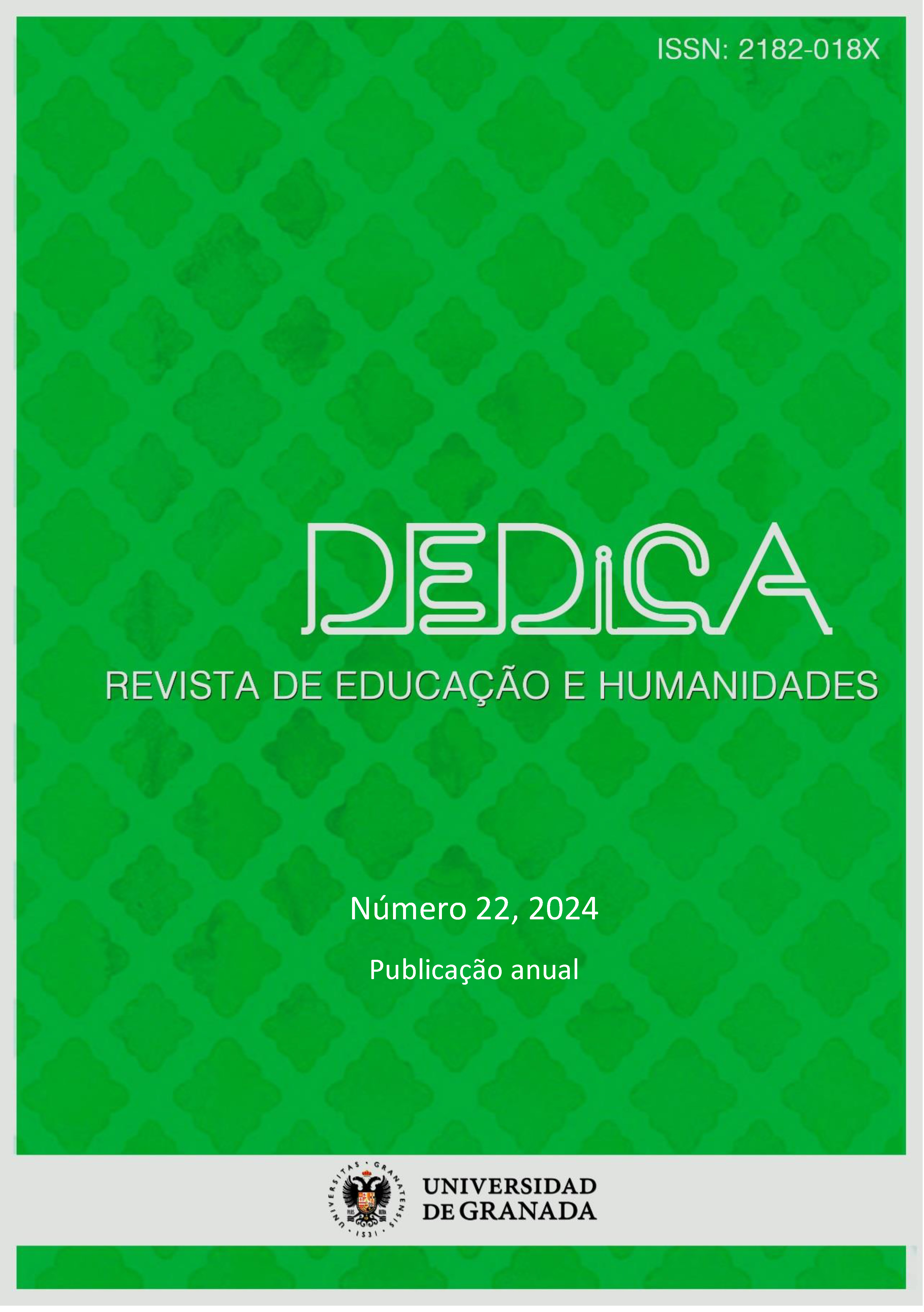Developing Computational Thinking Trough Exploratory Teaching
DOI:
https://doi.org/10.30827/dreh.22.2024.30107Abstract
Computational Thinking (CP) is a mathematical ability recognized in the specialty literature as essential in the problem-solving process. In this article we present a proposal to develop CP in the 4th year of primary school, through the Exploratory Teaching model. Three sessions were implemented, with the aim of developing the students' CP and overcoming their difficulties in interpersonal relationships. During the sessions, planned based on this teaching model, students collaboratively solved tasks involving mathematical concepts, such as spatial orientation, collection, organization and analysis of data and the interpretation and modeling of situations with multiplication in the combinatorial sense. These sessions promoted the incorporation of tasks that allowed the development of the five dimensions of CP and overcoming difficulties in interpersonal relationships, in addition to contributing to the deepening of the mathematical knowledge.
Downloads
References
Albuquerque, C. (2021). Pensamento Computacional e Matemática. Educação e Matemática, 162, 31–38.
https://em.apm.pt/index.php/em/article/view/2742
Ausiku, M.; Matthee, M. (2021). Preparing Primary School Teachers for Teaching Computational Thinking: A Systematic Review. Lecture Notes in Computer Science (Including Subseries Lecture Notes in Artificial Intelligence and Lecture Notes in Bioinformatics), 12511 LNCS, 202–213. https://doi.org/10.1007/978-3-030-66906-5_19
Azevedo, G. T. D.; Maltempi, M. V. (2020). Processo de Aprendizagem de Matemática à luz das Metodologias Ativas e do Pensamento Computacional. Ciência & Educação (Bauru), 26. https://doi.org/10.1590/1516-731320200061
Canavarro, A. P. (2011). Ensino exploratório da Matemática: Práticas e desafios. Educação e Matemática, 115, 11–17. https://dspace.uevora.pt/rdpc/bitstream/10174/4265/1/APCanavarro%202011%20EM115%20pp11-17%20Ensino%20Explorat%C3%B3rio.pdf
Canavarro, A. P.; Oliveira, H.; Menezes, L. (2012). Práticas de ensino exploratório da matemática: o caso de Célia. In Encontro de Investigação em Educação Matemática 2012: Práticas de Ensino da Matemática (pp. 255-266). https://www.researchgate.net/publication/228533131
Day, C. (1999). Developing Teachers: The Challenges of Lifelong Learning. (1st ed.). Abingdon (UK): Routledge. https://doi.org/10.4324/9780203021316
Decreto-Lei n.º 79/2014 do Ministério da Educação e Ciência. (2014), de 14 de maio. Diário da República: série I, n.º 92. https://data.dre.pt/eli/dec-lei/79/2014/05/14/p/dre/pt/html
El-Hamamsy, L.; Chessel-Lazzarotto, F.; Bruno, B.; Roy, D.; Cahlikova, T.;
Chevalier, M.; Parriaux, G.; Pellet, J. P.; Lanarès, J.; Zufferey, J. D.; Mondada, F. (2021). A computer science and robotics integration model for primary school: evaluation of a large-scale in-service K-4 teacher training program. Education and Information Technologies, 26(3), 2445–2475. https://doi.org/10.1007/S10639-020-10355-5
Espadeiro, R. (2021). O Pensamento Computacional no currículo de Matemática. Educação e Matemática, 162, 5-10.
https://em.apm.pt/index.php/em/article/view/2737
Grover, S.; Pea, R. (2013). Computational thinking in K–12: A review of the state of the field. Educational Researcher, 42(1), 38-43. https://journals.sagepub.com/doi/10.3102/0013189X12463051
Guerreiro, A.; Ferreira, R.; Menezes, L.; Martinho, M. (2015). Comunicação na sala de aula: a perspectiva do ensino exploratório da matemática. Zetetiké, 23(44), 279-295. DOI: 10.20396/zet.v23i44.8646539
Israel-Fishelson, R.; Hershkovitz, A.; Eguíluz, A.; Garaizar, P.; Guenaga, M. (2021). A Log-Based Analysis of the Associations Between Creativity and Computational Thinking. Journal of Educational Computing Research, 59(5), 926-959. https://doi.org/10.1177/0735633120973429
Korkmaz, Ö.; Çakir, R.; Özden, M. (2017). A validity and reliability study of the computational thinking scales (CTS). Computers in Human Behavior, 72, 558–569. https://doi.org/10.1016/j.chb.2017.01.005
Lee, J.; Joswick, C.; Pole, K.; Jocius, R. (2022). Algorithm design for young children. Contemporary Issues in Early Childhood, 23(2), 198–202. https://doi.org/10.1177/14639491211033663
Lopes, J. P.; Silva, H. S. (2020). 50 Técnicas de Avaliação Formativa (2º ed.). Lisboa (Portugal): PACTOR Edições de Ciências Sociais, Forensese da Educação.
Ministério da Educação (2021). Aprendizagens Essenciais de Matemática. Lisboa: ME.
Moschella, M.; Basso, D. (2020). Computational thinking, spatial and logical skills. Na investigation at primary school. Journal of Theories and Research in Education, 15(2), 69-89. https://rpd.unibo.it/article/view/11583/11797
OECD (2022). Pisa 2022 Mathematics Framework. PISA 2022: Mathematics Framework (oecd.org).
Oliveira, H.; Menezes, L.; Canavarro, A. (2013). Conceptualizando o ensino exploratório da Matemática: Contributos da prática de uma professora do 3.º ciclo para a elaboração de um quadro de referência. Quadrante, 22(2), 1-25. http://hdl.handle.net/10174/10618
Özcan, M.; Çetinkaya, E.; Göksun, T.; Kisbu‐Sakarya, Y. (2021). Does learning to code influence cognitive skills of elementary school children? Findings from a randomized experiment. British Journal of Educational Psychology, 91(4), 1434–1455. https://doi.org/10.1111/bjep.12429
Ponte, J. P. (2005). Gestão curricular em Matemática. In GTI (Ed.), O professor e o desenvolvimento curricular (pp.11-34). APM. https://repositorio.ul.pt/handle/10451/3008.
Rodrigues, R. N.; Fonseca, J.; Costa, C.; Martins, F. (2022). Pensamento computacional: dimensões desenvolvidas numa intervenção no estágio pedagógico. In Martins, F; Pinto, R.; Costa, C. (Eds.) Artefactos digitais, aprendizagens e conhecimento didático (pp. 117-134). Coimbra (Portugal): Instituto Politécnico de Coimbra – Escola Superior de Educação. https://comum.rcaap.pt/bitstream/10400.26/46893/1/Pensamento%20computacional.pdf
Stein, M. K.; Engle, R. A.; Smith, M. S.; Hughes, E. K. (2008). Orchestrating productive mathematical discussions: Five practices for helping teachers move beyond show and tell. Mathematical thinking and learning, 10(4), 313-340. https://doi.org/10.1080/10986060802229675
Torres, J.; Figueiredo, M. (2021). Aprender Matemática para programar ou programar para aprender Matemática?. Educação e Matemática, 162, 11–14. https://em.apm.pt/index.php/em/issue/view/162
Voon, X. P.; Wong, S. L.; Wong, L.-H.; Khambari, M. N. M.; Syed-Abdullah, S. I. S. (2022). Developing Computational Thinking Competencies through Constructivist Argumentation Learning: A Problem-Solving Perspective. International Journal of Information and Education Technology, 12(6), 529–539. https://doi.org/10.18178/IJIET.2022.12.6.1650
Wing, J. (2006). Pensamento Computacional. Educação e Matemática, 162, 2-4. https://em.apm.pt/index.php/em/article/view/2736/2781












